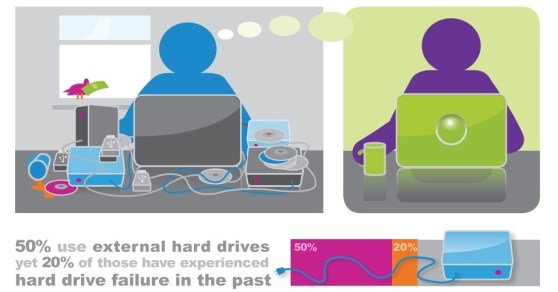 This sponsored post is by Carbonite, a leading online backup provider for consumers and small to medium sized businesses.
This sponsored post is by Carbonite, a leading online backup provider for consumers and small to medium sized businesses.
Are you ready to say goodbye to your hard drive? Would you lose important data if it suddenly stopped working today? Neither internal nor external hard drives are meant to last forever, even under optimal conditions. The average warranty for hard drives ranges from one to five years, and a drive’s lifespan can be drastically and unexpectedly shortened by power surges, viruses, malware, natural disaster, or accidents (like knocking over your glass of water).
Once you come to terms with the fact that your hard drive will eventually let you down, it’s time to prepare your business for that inevitable day. Many businesses back up the files they deem important, but admit it’s a chore and not something they do as often as they should due to the time commitment and cost. If you aren’t automatically and continuously backing up all of your data, you’re not as protected as you need to be against data loss. Automatic online backup can make a world of difference in the outcome of a data disaster, and is much more affordable than hiring someone to recover your data after it’s gone. If you’re still backing up using outdated and risky methods like external hard drives, USB/flash drives or DVDs, keep reading because a recent Carbonite customer’s story might just change your mind.
We recently received a letter from our customer Mark Batchelor. As an IT consultant who writes software for firms that serve the international accounting industry, Batchelor had always instituted a formal backup and recovery plan. But as the years went by, human nature eventually took over and his backups became more sporadic and less reliable. He has now experienced hardware failure several times, but with very different results.
Disaster Strikes
In 2005, Batchelor experienced his first data lost, as the result of a hardware failure. He was able to restore his system to about 80 percent of what was there previously, but it took him two long weeks to piece everything together.
Then in 2010, a careless kick of an outlet plug caused his computer’s hard drive to fail completely. Though he had been using DVDs to back up his data, they were out of date; so, Batchelor lost financial records, irreplaceable photos and scanned documents that had since been shredded. When he realized everything was lost, he sent his hard drive to a data recovery service and was willing to pay thousands of dollars to retrieve his data. After four months of trying, the data recovery specialists gave up and none of his data was saved.
A new system
After his catastrophic data loss, Batchelor purchased a Carbonite subscription along with his brand-new office computer. Not even a year later, he experienced another hard drive crash. But this time, Batchelor was able to use Carbonite to recover all of his important business files. He left his house for the day, and when he came home, his files were back in their proper place. He immediately upgraded to a multi-year subscription and set it to auto-renew, noting that three years of backup protection was just a fraction of what his failed data recovery service cost.
Batchelor’s foresight and purchase of an automatic backup solution saved him time and money, and offered him peace of mind. Whether your computer stores business records, financial data, research, or photos and videos, it’s easy to protect your files from data loss. If you’re interested in learning more about how to protect your valuable business data, start a free 30-day trial at www.carbonite.com or give the Carbonite business team a call at 1-855-CARB-BIZ. The only regret you’ll have is that you didn’t do it sooner. Just ask Mark.
VentureBeat's mission is to be a digital town square for technical decision-makers to gain knowledge about transformative enterprise technology and transact. Learn More

